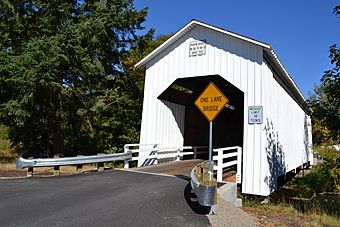Parvin Bridge facts for kids
Quick facts for kids |
|
|
Parvin Bridge
|
|

Parvin Bridge
|
|
| Nearest city | Dexter, Oregon |
|---|---|
| Area | 0.1 acres (0.040 ha) |
| Built | 1921 |
| Built by | George W. Breeding |
| Architectural style | Howe truss |
| MPS | Oregon Covered Bridges TR |
| NRHP reference No. | 79003767 |
| Added to NRHP | November 29, 1979 |
The Parvin Bridge is a special kind of bridge called a covered bridge. It is found in Lane County, Oregon, in the United States. This bridge was built in 1921. It crosses a stream called Lost Creek. Lost Creek flows into the Middle Fork Willamette River.
Contents
Building the Parvin Bridge
The Parvin Bridge was built to replace an older bridge. The first bridge was 66 feet (20 meters) long. It used a design called a Howe truss. In 1917, a bridge inspector named J. W. McArthur checked the old bridge. He found that its wooden parts were badly damaged by worms. He said the wood was like "powder" from the worm damage. He thought a new bridge would be needed very soon.
In 1921, George W. Breeding built the current Parvin Bridge. He built it in the same spot as the old one. The new bridge cost $3,617 at that time. This would be about $59.3 thousand today.
What is a Howe Truss?
The Parvin Bridge also uses a Howe truss design. A Howe truss is a type of bridge structure. It uses both wood and metal parts. The main parts are made of wood. Metal rods are used to connect them. This design helps make the bridge strong. It was invented by William Howe in 1840.
A New Life for the Bridge
The Parvin Bridge is 75 feet (23 meters) long. It has a single lane for traffic. It also has long ramps leading up to it. The eastern ramp is 62 feet (19 meters) long. The western ramp is 17 feet (5.2 meters) long.
In the mid-1970s, the road around the bridge was changed. This meant cars no longer drove over the bridge. It became a bridge only for people walking. But later, the bridge was fixed up. On November 17, 1986, a special ceremony was held. The bridge was reopened for cars again. It now has a weight limit of 10 short tons (9,100 kg).
A Historic Landmark
The Parvin Bridge is important because of its history and design. It is listed on the National Register of Historic Places. This list includes places that are important to the history of the United States. Being on this list helps protect the bridge for future generations.
 | Calvin Brent |
 | Walter T. Bailey |
 | Martha Cassell Thompson |
 | Alberta Jeannette Cassell |



